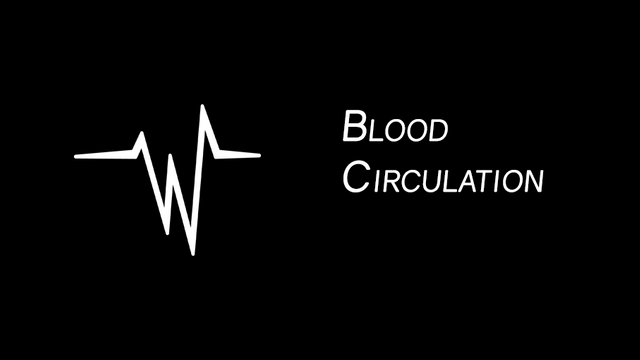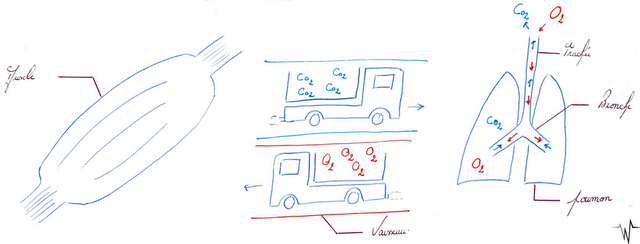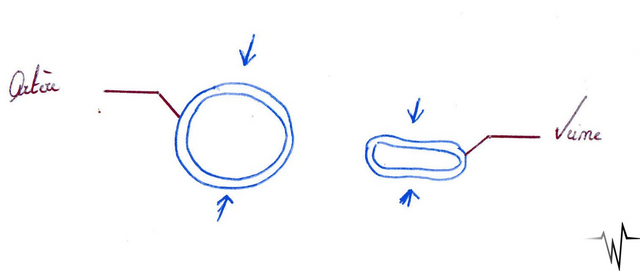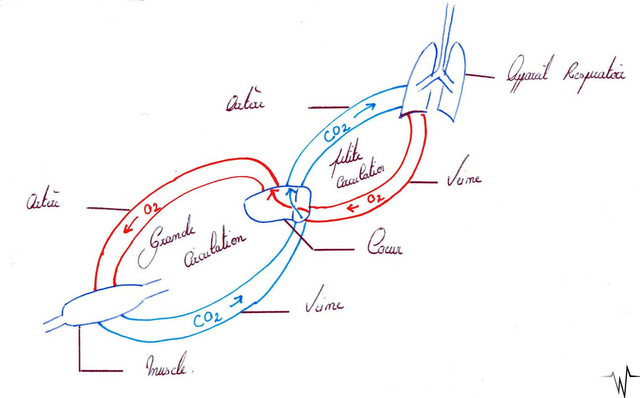The Blood Circulatory System … It’s just like playing Mario Kart 8 !
This article is a translation of a french article written by @whentone, a steemian who talk about medecine, health and science. It’s him who suggests me to translate it. I encourage you to have a look to his page ! 😊

Source : @Whentone
To my mind, the circulatory system isn’t a complicated concept. You just need to have some informations and you will be able to understand an important part of the human anatomy.
The bloodstream was discovered by W. Harvey in the 17th century.
What is the purpose of the bloodstream ?
The human bloodstream aims to oxygenate our organs, and to eliminate the waste they product. Among those waste, there is the carbon dioxide (CO2).
To be simple and playful, just imagine that in your blood circulate plenty small trucks. Those trucks start from the lungs, with a cargo full of oxygen, and move towards an organ (or a muscle), the biceps for example. Once arrived in the biceps, trucks unload their oxygen (O2) and, in return, they take the carbon dioxide back. After that, trucks full of carbon dioxide continue their way and arrive back to the lungs ! Lungs are then going to trade the carbon dioxyde against oxygen, and trucks move again to the biceps (or to another organ) to distribuate the oxygen and start again the cycle.

Source : @Whentone
Is that really so simple ?
No, but it’s not really more complicated !
First of all, small trucks are called the red blood cells (we will talk about those cells in a future article)
Then, you have to split the bloodstream in 2 parts :
- The small circulation (pulmonary circulation)
- The big circulation (systemic circulation)
In order to stay simple and playful, we will keep the theme of the automobile. Have you already seen a race circuit in the shape of an « 8 » ? If yes, bloodstream is just the same : the little loop of the « 8 » represents the small circulation, where we can find the respiratory system, whereas the big loop represents the big circulation, where we can find the organs, which need to be oxygenate. In the middle, where the two loops cross, there is : the Heart.
What is the difference between arteries and veins ?
A lot of people think that arteries carry high oxygenate blood, with a red color, whereas veins carry poor oxygenate blood, with a blue color. It’s wrong.
To make the distinction between arteries and veins, you mustn’t look to the type of blood they carry, but to their structure.
- An artery is able to ensure high pressure, so they start from the heart. They are round and unalterable .
- A vein isn’t able to ensure high pressure, sot they land to the heart. They are flatter and easily alterable.
=> (An echographic sign of deep vein thrombosis is consequently the impossibilty to compress the vein, we will talk about that later if you want to !)
Source : @Whentone
So, linking this information to the subject of our article, we can understand that :
- In the big circulation, the oxygenated blood is carried by arteries, and the poorly oxygenated blood is carried by the veins
- In the small circulation, the poorly oxygenated blood is carried by the arteries, and the high oxygenated blood is carried by the veins.
Source : @Whentone
And that’s how my first article ends ! I hope you have had a nice timing reading it, and that your retina hasn’t been burned by the quality of my patterns !
If you have any questions, you can ask me them by a comment or in private or in the discord : whentone#6428 !
Thanks for reading me, see you soon !
Whentone
Sources :
• None, I only have remember all the knowledge I’ve learned in my university.
To go further (in french ;) ):
• https://www.reseau-canope.fr/corpus/video/harvey-et-la-circulation-sanguine-140.html : A nice video about the bloodstream!
• http://www.lycee-sainte-cecile.com/sites/resources/files/Biologie-Physiopathologie/diaporama%20LE%20CUR%20ET%20LA%20CIRCULATION%20SANGUINE.pdf : An high level article about bloodstream !

